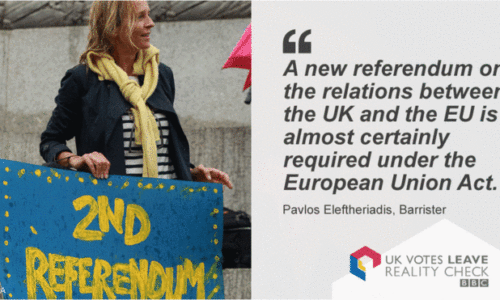
The claim: The referendum lock introduced by the coalition government in 2011 means that there will have to be a second referendum before the UK leaves the EU.
Reality Check verdict: It’s far from clear that there’s any legal requirement for a second referendum and, even if there were, the referendum lock could be repealed.
The European Union Act 2011, passed by the coalition government, created a so-called “referendum lock”. Its purpose was to create a legal requirement to hold a referendum if any proposal were made to transfer further powers from the UK to the EU.
However, because of the way the Act is worded, some people have argued that it could be used to force a second referendum before the UK leaves the EU. It says that any new treaty that amends or replaces one of the existing primary EU treaties should be subject to a referendum before it can be ratified.
Pavlos Eleftheriadis, a barrister and legal academic, argues that any withdrawal agreement the UK negotiates with the EU, and any future trade agreement, will effectively replace the existing treaties – and hence, under the terms of the 2011 Act, will require a new referendum.
Does this argument stand up? It’s not really clear that it does.
Prof Mark Elliott of Cambridge University argues that the 2011 Act applies to proposals to amend or replace the existing treaties in the context of the UK’s membership of the EU. It would not apply to a new set of arrangements to manage relations after the UK had left.
Furthermore, even if it were true that the 2011 Act created a requirement for a second referendum, then it could be avoided anyway by repealing the Act. That would mean both Houses of Parliament agreeing to overturn the existing law. But it wouldn’t necessarily be particularly difficult.
We saw in June that new legislation could be passed very quickly when the deadline for voter registration in the referendum was extended. And acts of Parliament have been repealed in the past with very little fuss – for example, when George Osborne overturned Gordon Brown’s Fiscal Responsibility Act.
More generally, as long as the government and Parliament are agreed that the referendum result should be enacted, it’s hard to see that any legal obstacle would be insuperable. Ultimately, Parliament makes the laws.

No comments:
Post a Comment